Swarmkeeper
Hero
Maybe some of these resources will help?
 www.sersavictory.com
www.sersavictory.com
Part of where I'm going here: not every character is proficient at every saving throw.

 www.levelup5e.com
www.levelup5e.com
Honestly? I don't know. With the way the game is written and the "expected challenges" of traps I can't really think of any way to do it without completely rewriting the game.
The best version of traps I have found is the "click" method, I think from Dungeon Dudes, which basically allows the players to react to a trap being triggered to try and avoid it by declaring an action. It still doesn't really solve a lot of the bigger problems with traps.
Testament of Malice.pdf
 www.sersavictory.com
www.sersavictory.com
Puzzles and Riddles are a constant headache, and I've tried to figure out a way to utilize them that isn't just challenging the players while they take a break from DnD.
Puzzles Suck | The Angry GM
The Angry GM delivers advice to players and dungeon masters of fantasy role-playing games with humor, snark, and attitude. Game masters and players are sure to find something of use, whether they are playing AD&D, D&D 3.5, D&D 4E, 5E, Pathfinder, D&D Next, or any other role-playing game.
theangrygm.com
Can't find any good... er... resources for you here.Resource management is fairly boring, but mostly it is a solved problem. Barring needing a wagon to carry water (and then hiring a small army to care for the wagon and the mules) it isn't something that is a challenge I've found.
Sounds like something the players and DM are responsible for. The game provides the basic parameters, the people provide the imagination to make it fantastic. No?But, perhaps the biggest, the game just doesn't make the world fantastical enough.
No ice storms or volcanoes or tidal waves or extreme temperatures or anti-magic zones or strange planes in your games?Most exploration problems are things handled the same way at level 2 as they are at level 5 as they are at level 17. The numbers get bigger, but the actual mechanisms rarely change. And there is no "dangerous wilderness" past around level 5, it simply doesn't exist.
Part of where I'm going here: not every character is proficient at every saving throw.
The closest to something really good I've found in 5e so far is the Tasha's environments, those are a really cool idea, but a lot of it is still wandering monsters to fight and traps that hit your hp. It doesn't offer a lot of options, not in the way I was hoping.
As was said, the best parts of exploration are when you are discovering the context of the adventure, finding the clues, but you can't make mechanics for that. You can't make mechanics for descriptions.

Let’s Look At Exploration — Level Up: Advanced 5th Edition (A5E)
One of our primary goals with Level Up is to expand and fully flesh out the game’s exploration pillar.
so, I'm really not sure. There are a lot of different problems, and I'm not sure there is one solution.



